If you found Factorio engaging, there are numerous similar games ready to captivate you even more.
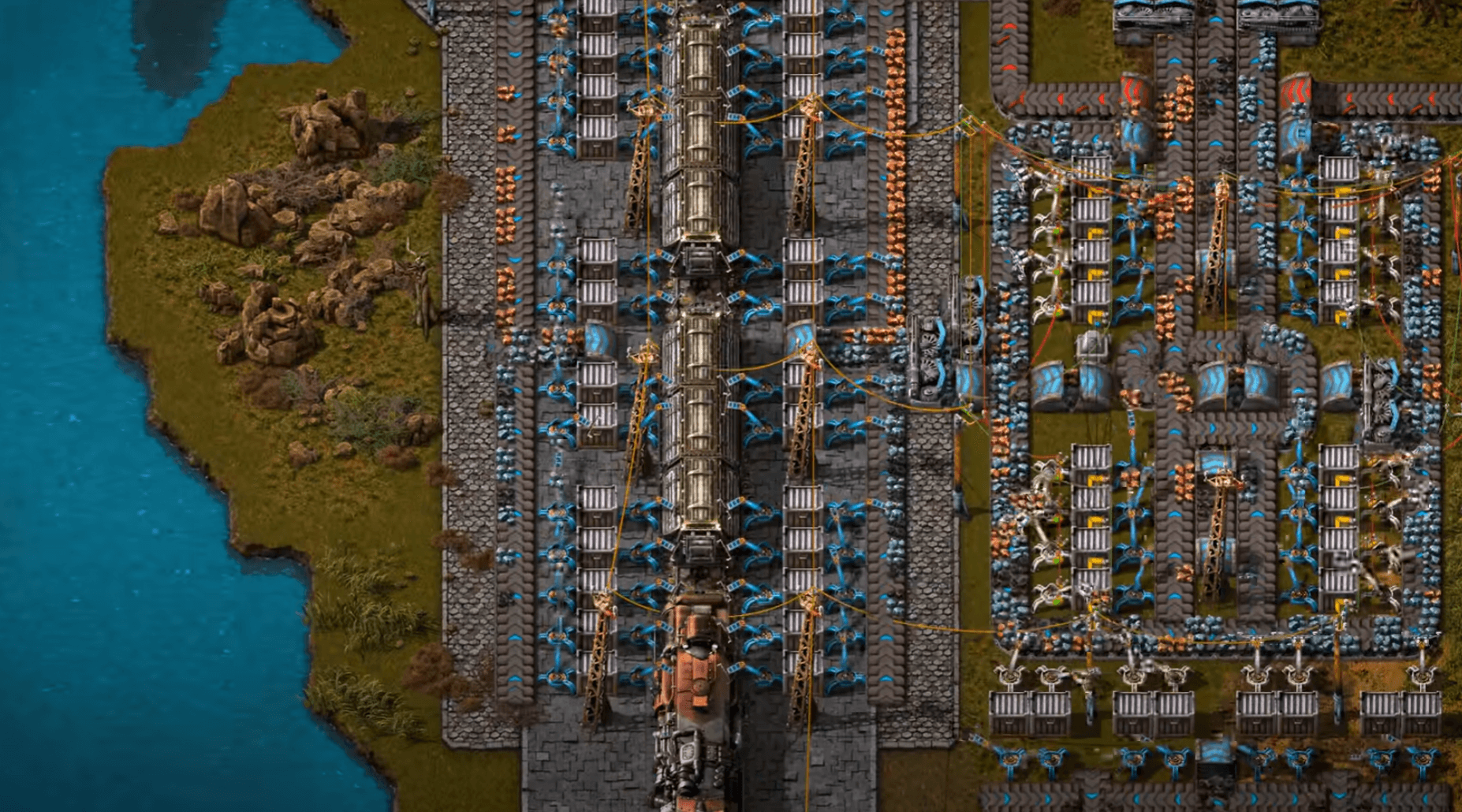
If you’re into sprawling construction and resource management games, Factorio could be your cup of tea. It's a complex strategy game that requires you to build and maintain factories on an alien planet. The aim is to automate production and fight off the planet's inhabitants, with the ultimate goal of constructing a rocketship to call down help. The game is unique due to its multi-layered crafting system which requires you to optimize supply chains, and a massive tech tree that promises tons of replayability.
Factorio is one of the most engrossing games you can find, with its blend of strategy, survival, and construction elements. It offers an immersive experience, integrating elements of tower defense, logistics, exploration, and even a bit of combat. The complexity is this game's selling point, and if you're a fan of multitasking and complicated design paths, it will provide countless hours of deep gameplay. And if you fancy that, there are other games of the same ilk that you might find intriguing. Games that will make you plan, strategize, build and manage resources in ways that will challenge and stimulate you. Do you want to discover them?
25. Satisfactory
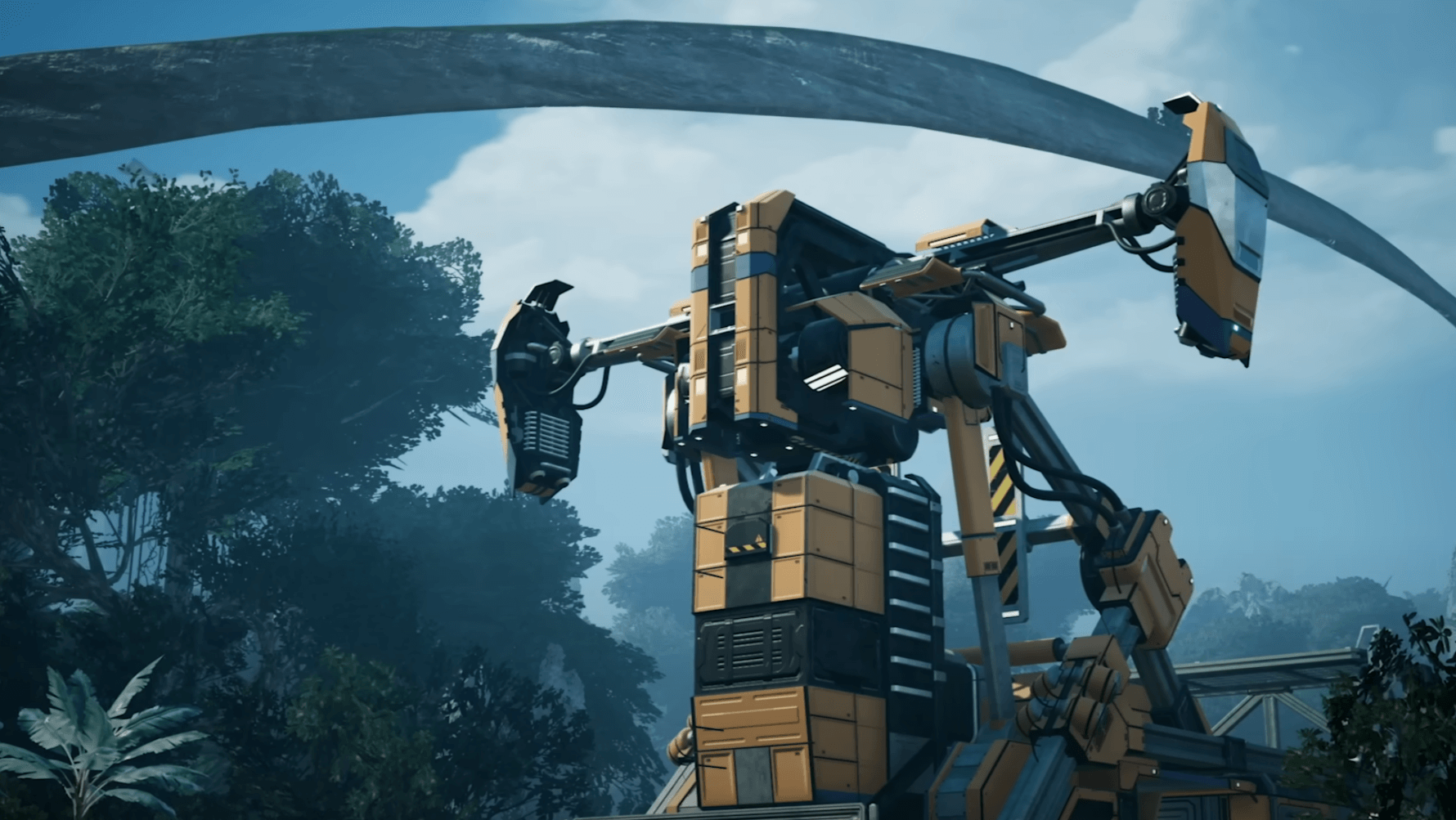
If you enjoyed Factorio for its industrial production and automation mechanics, then Satisfactory is certainly a game you should consider next. Just like in Factorio, you arrive on an alien planet with only a handful of tools, and your mission is to construct and manage enormous factories. The primary objective is to harvest resources from the environment and transform those into valuable products. However, Satisfactory takes Factorio's 2D gameplay and expands it into an immersive 3D experience, which takes factory building and management simulation to the next level. The game also introduces verticality in factory-building, giving players the independence to design factories that ascend into the sky, creating towering monuments to industry.
Satisfactory isn't just elegant design and complex production lines; it features a vast open world for you to explore. Various biomes on the alien planet harbour unique fauna and flora, each with their distinct ecosystems and challenges. This adds a survival element, echoing the hostile creatures present in Factorio. Exploration is rewarded as you can discover new technologies and tools that will aid in your industrial endeavours. If you love the intricacies of constructing automated factories, managing resources and exploring alien worlds as in Factorio, Satisfactory is the logical progression for you.
Satisfactory is available on PC, primarily on the Epic Games Store and recently on Steam, typically priced around $30 USD.
24. RimWorld
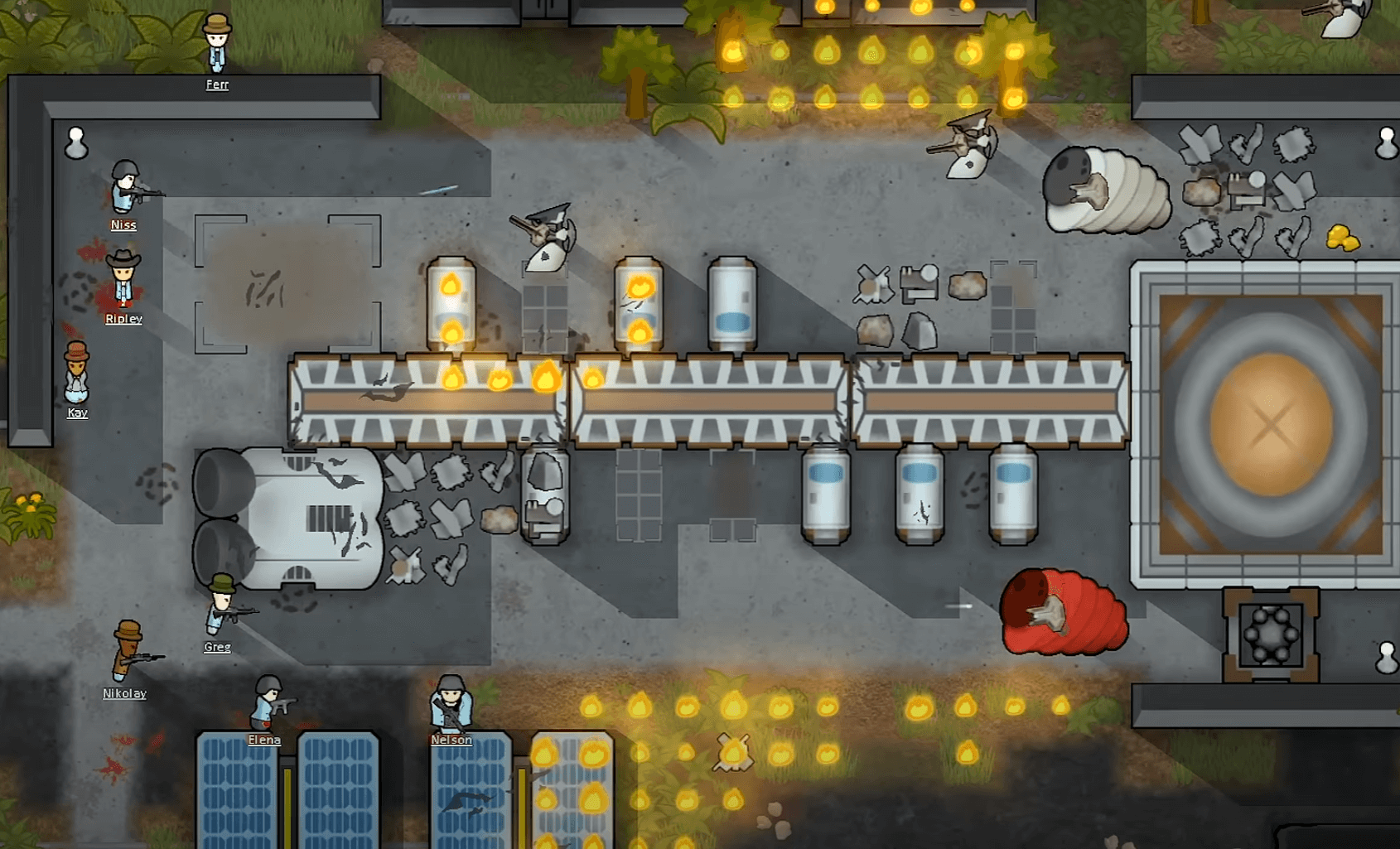
Even though RimWorld and Factorio may seem like very different games at first glance, they have a surprising number of shared elements that make them an absolute joy for fans of management and simulation games. Just like Factorio, RimWorld is all about careful planning, base building, resource management and survival. One of the biggest similarities between these two games is the mentality of the player; you start with nearly nothing and slowly expand, improving your infrastructure and defenses as you go along. Both games are built around a cycle of exploring for resources, exploiting those resources, and then using the results to improve their base and technology. This combination of exploration, expansion, and development create engaging gameplay that can keep players coming back for hours upon hours as they strive to achieve their goals.
Beyond the mechanics of gameplay, RimWorld shares Factorio's approach to procedural generation and storytelling. Both games allow you to create your own characters, complete with unique abilities and personalities. This adds an extra layer of depth and replayability to both games, ensuring that no two playthroughs are ever exactly the same. In RimWorld, like Factorio, every single game you play will be unique, thanks to its clever use of AI Storytellers that control events throughout the game. This makes both games exceedingly fun and immersive as you never know what situation you’ll need to overcome next, although you can bet it will be something that puts your strategic skills to the test.
RimWorld is available on PC platforms such as Steam and GOG, typically priced around $34.99 USD. If you enjoy games that require strategic planning, procedural storytelling and skillful resource management, RimWorld could be just the game for you.
23. Oxygen Not Included
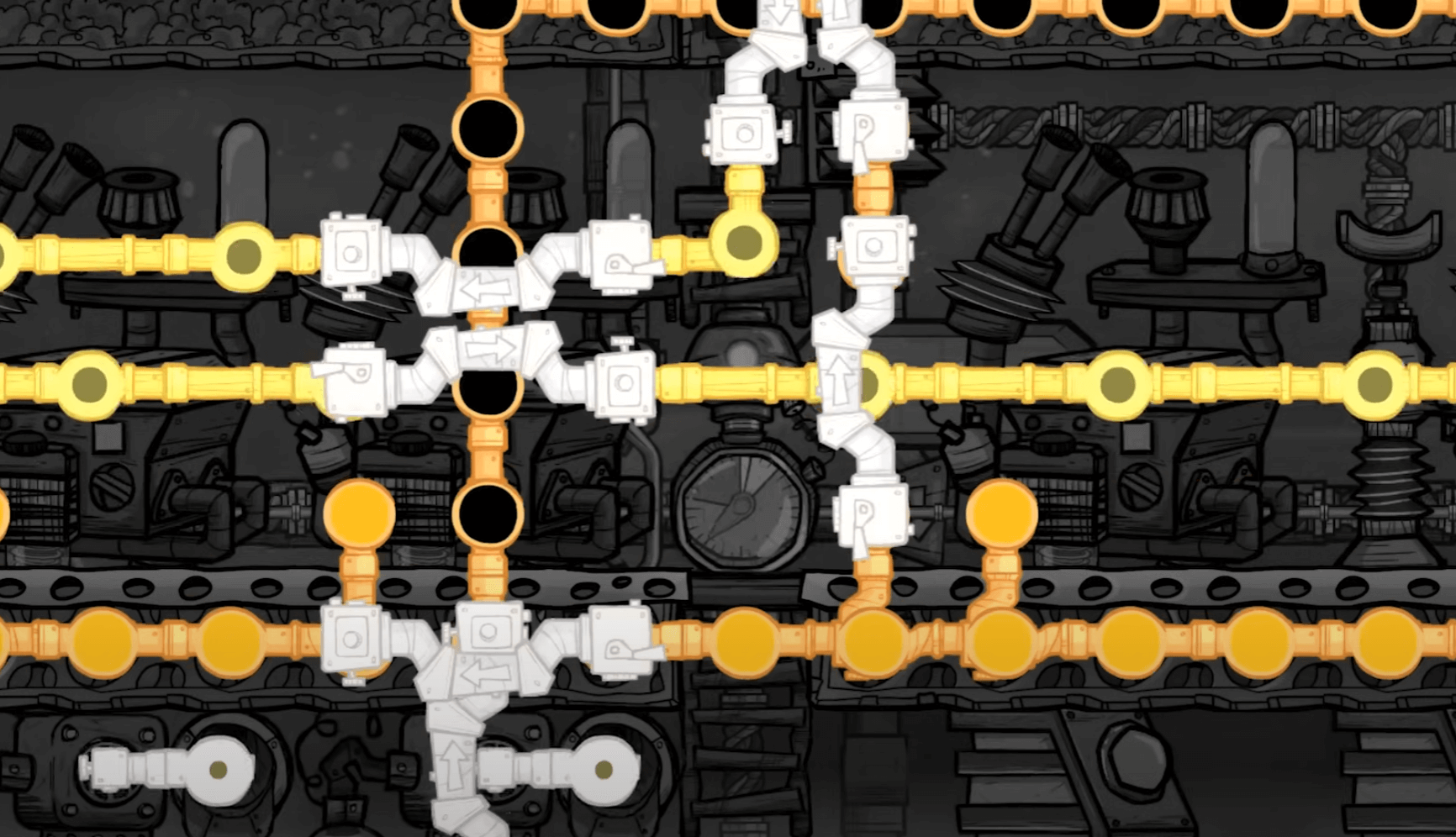
Firstly, Oxygen Not Included like Factorio has a very deep sense of resource allocation and management. Just as in Factorio where you have to manage resources and logistics to construct and automate an ever-expanding factory, Oxygen Not Included takes a similar concept and adds a whole new layer. Instead of just building factories, you are tasked with managing life support systems for a space colony in an unforgiving alien environment. This includes digging for resources, designing and keeping an eye on complex systems for life support, and managing the needs of your colonists. It stimulates problem-solving skills as you are constantly challenged to optimize your designs to keep your colonists alive and comfortable.
Furthermore, another key similarity between the two games is the element of complex automation. While in Factorio, you are creating intricate conveyor systems to automate the production of goods on an alien planet, Oxygen Not Included requires you to automate an entire ecosystem to support the survival and comfort of your space colony. Open-ended processes like water purification, food production, air filtration systems and waste recycling to name a few are to be executed efficiently. Both games provide a sandbox approach which means you are free to design your solutions with as much creativity as you desire.
Oxygen Not Included is available on multiple platforms like Windows, macOS, and Linux. It is typically priced around $25 USD, offering hours of engaging gameplay, problem-solving challenges, and management dynamics.
22. Civilization VI

In certain aspects, Civilization VI is similar to Factorio. Both games share a common thread when it comes to resource management, planning, and strategizing towards achieving a set goal. Just as you would design and manage complex factories or industrial processes in Factorio to produce automated processes for your desired outcomes, Civilization VI requires a harmonious combination of resource management and strategic planning to lead your civilization to a certain victory condition. You manage resources like science, culture, faith, etc., plan city locations, negotiate deals, direct research to gradually build your civilization. You might even argue that Civilization VI has an aspect of automation to it, similar to Factorio, as you must reinvent technologies and adjust your focus depending on the evolving environments.
The strategy element in both games is both intensive and extensive, providing you the opportunity to plan and execute broad and complex stratum of action. Gameplay in both games succeeds in delivering a sense of satisfaction when well-laid plans come into fruition. Like in Factorio, Civilization VI rewards wise planning, strategic thinking, and efficiency, but it also throws an element of diplomacy into the mix. You'll be dealing with rival civilizations, managing relationships, and negotiating trade deals and treaties, adding another layer of immersive complexity, somewhat similar to handling and adjusting to emergent scenarios in Factorio. These two games might belong to different genres, but they share a mutual philosophy of strategic planning and resource management with a dash of unpredictable elements, making for an enjoyable gaming experience.
Civilization VI is available on PC, PlayStation 4, Xbox One, and Nintendo Switch, typically priced around $60 USD.
21. Kerbal Space Program
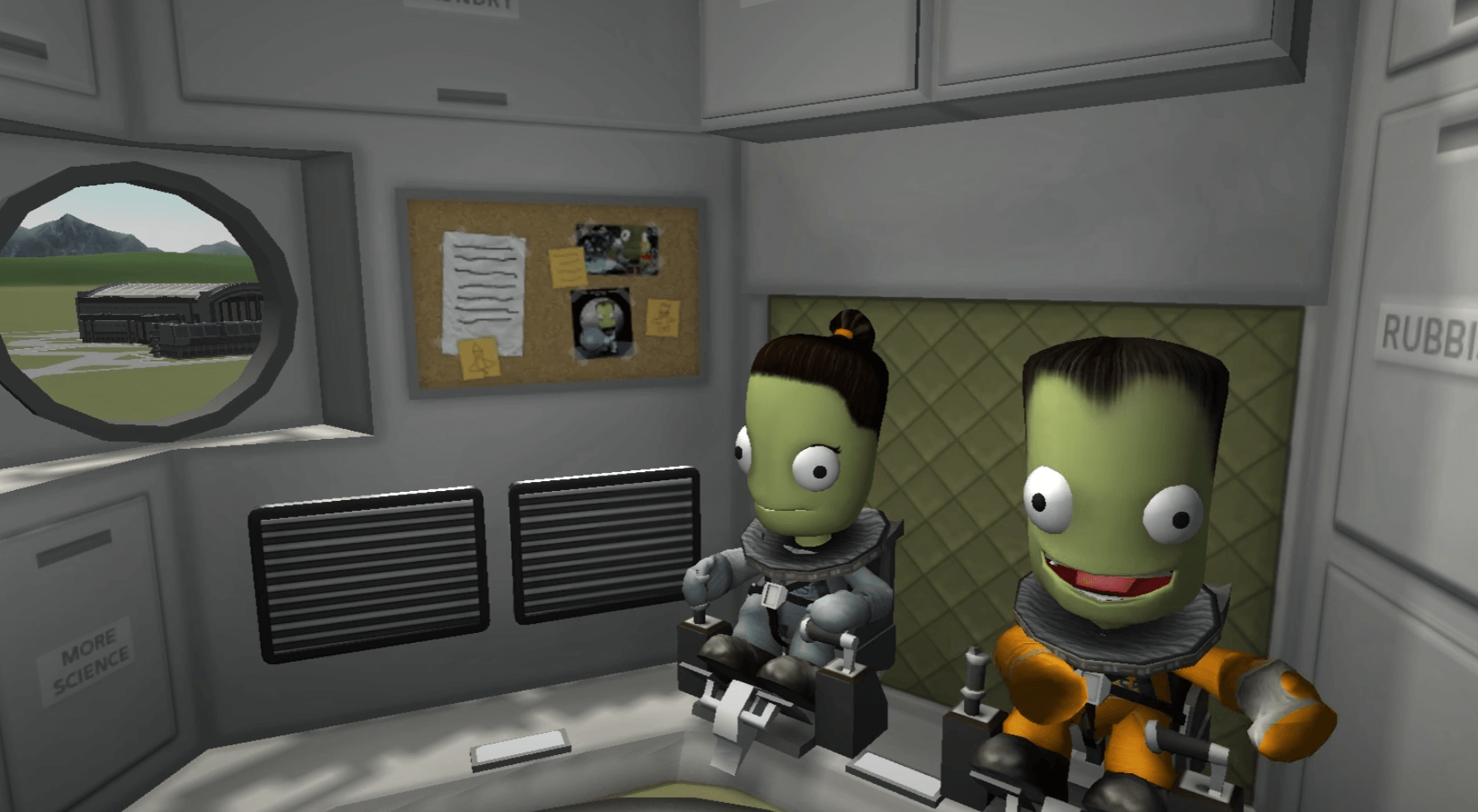
As you enjoyed Factorio, you're really going to appreciate Kerbal Space Program's similar design fundamentals. Just like in Factorio, you're given an ambitious goal, and the tools to methodically build towards that objective. Kerbal Space Program isn't about quick rewards, it's about slowly but surely understanding its systems and working out the best way to exploit them. You'll begin by constructing simple rockets, gradually progressing to complex spacecraft capable of interplanetary travel. The sense of achievement you get from designing and executing a successful mission is on par with that extraordinary sensation you get from building a fully automated production line in Factorio.
More than that, these are both games about trial and error, learning from your mistakes and constant optimizations. Both games are full of joyous surprising moments when your hard work pays off, or heartbreaking ones when your carefully planned but poorly executed project falls apart. They also encourage creativity and thinking outside the box. Also, they both offer a fantastic sense of scale and long gameplay hours, extending beyond hundreds. Planning and executing new projects while managing resources syncs so well with Factorio's core loop, making Kerbal Space Program a must-try if you loved Factorio's gameplay experience.
Kerbal Space Program is available on Microsoft Windows, OS X, PlayStation 4, Xbox One, Linux, Wii U, and PlayStation 5, typically priced around $40 USD.
20. Prison Architect
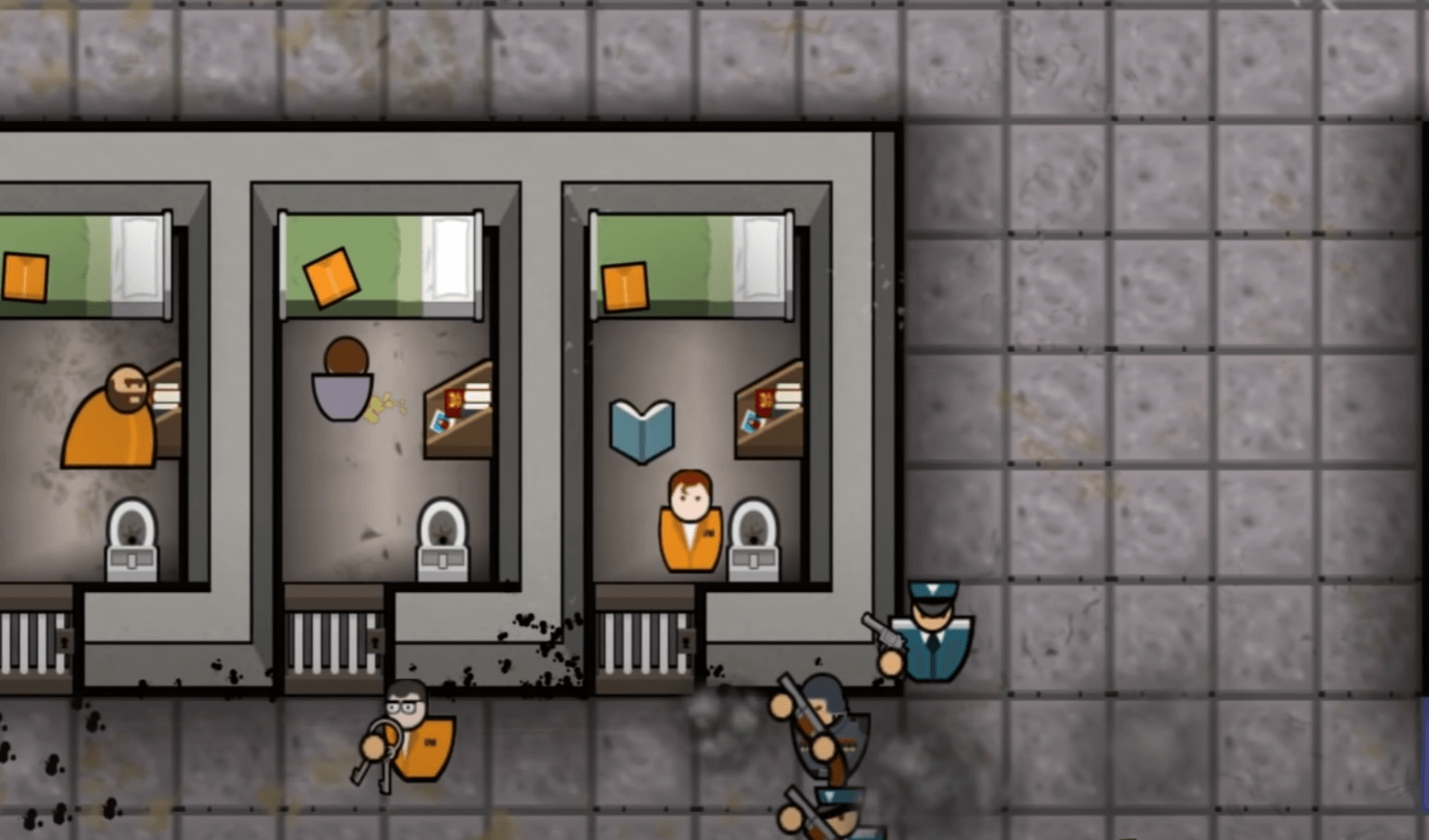
If you loved the management and construction mechanism of Factorio, Prison Architect is definitely a game you should try. Just like Factorio, it's a game themed around design, building and managing. Instead of mining industries, it asks you to construct and maintain a maximum security prison. It's not just about the physical infrastructure though - it's about creating a self-sustaining ecosystem, where every decision has an impact. Dealing with overlapping systems that need to be fine-tuned to get the optimal outcome is a huge parallel with Factorio, making Prison Architect a sure hit among its fans.
These games share similar principles at their core. You need to plan wisely and efficiently, and make the best use of the resources available to you. They both offer a fast-paced challenge of juggling multiple tasks and keeping things running smoothly. In Prison Architect, you have to consider the layout of your prison, the placement of facilities, and how your staff operates. Factorio players who enjoy deconstructing problems and maximizing efficiency will love the in-depth planning and problem-solving elements that are intrinsic to Prison Architect. You'll quickly find yourself fully immersed in optimizing your prison's day-to-day operations, just like you were with your factory in Factorio.
Prison Architect is available on PC/Mac, PlayStation 4, Xbox One, and Nintendo Switch, typically priced around $30 USD.
19. Surviving Mars

If you're a fan of Factorio, you're sure to find enjoyment with Surviving Mars. Both games are all about strategy, planning, and resource management with an emphasis on automation. In Surviving Mars, much like in Factorio, you will be starting from scratch, only this time, it’s on the Red Planet. The aspect of constructing and maintaining a fully functional colony on an alien landscape will provide an engagement level similar to constructing and running a factory on an alien world in Factorio.
Both games require you to utilize and manage resources effectively and create infrastructures that run with little to no human intervention while steadily improving efficiency and expanding your reach. The unique, extra-terrestrial environment provides plenty of challenge and depth for you to dive into, which matches the compelling gameplay loop present in Factorio. The thrill of overcoming obstacles and progressing into increasingly complex designs offers a similar sense of achievement as you progress through technological tiers and advance your colony’s capability.
Surviving Mars is available on PC, PS4, and Xbox One, typically priced around $30 USD.
18. Tropico 6
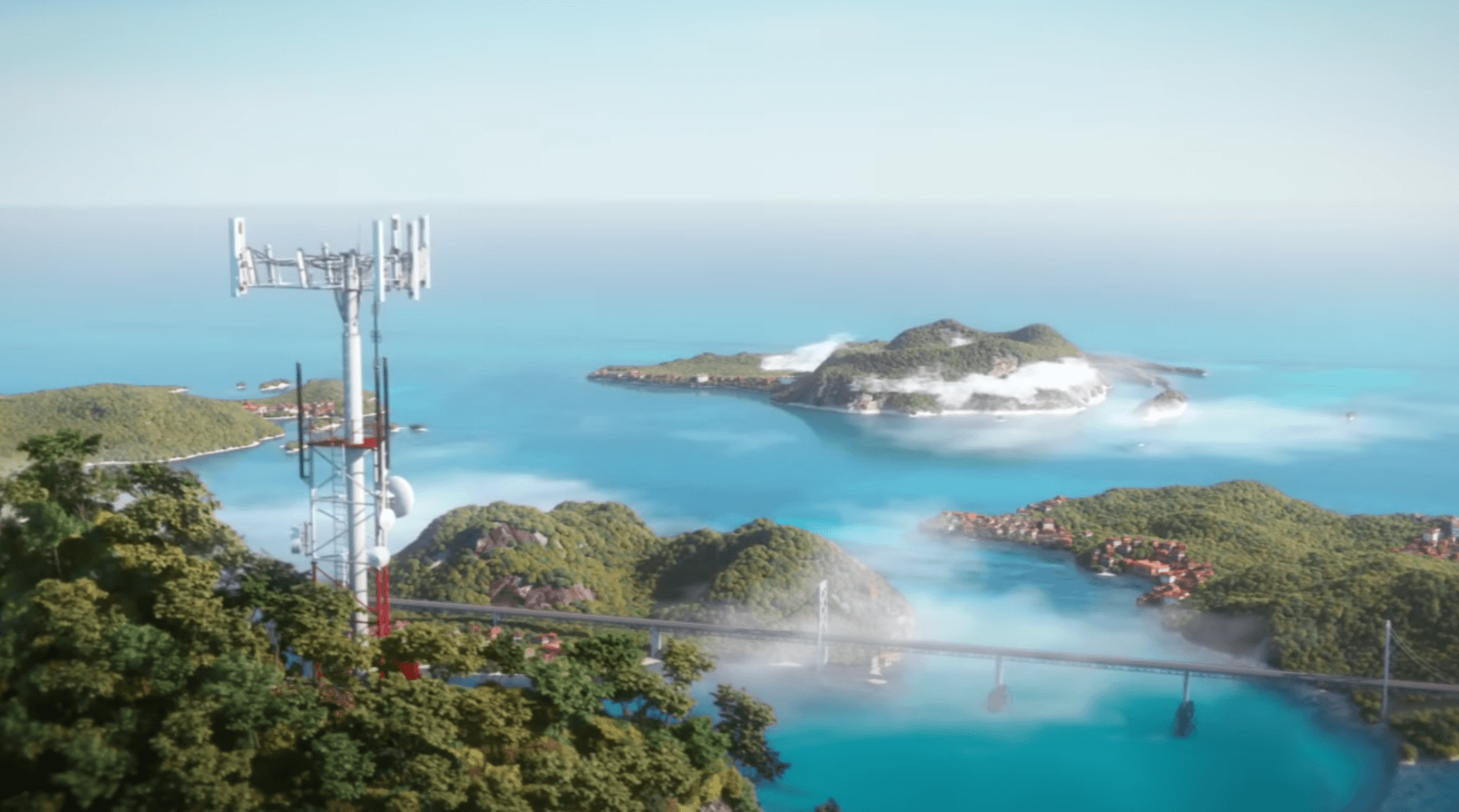
Both Tropico 6 and Factorio are essentially management and construction simulation games. Similar to Factorio, in Tropico 6, you're placed in the role of overseeing and managing resources to build and expand your empire. You start with a relatively small number of resources that must be managed efficiently in order to achieve your goals. The construction and assembly mechanics, the manipulation of supply chains, and the strategic planning to maximize productivity are all shared core gameplay elements between Tropico 6 and Factorio.
Tropico 6 offers a unique twist with its political system, which adds an extra layer of complexity and immersion that Factorio players might appreciate. In addition to managing resources and infrastructure, you also assume the role of a president in Tropico 6. You're tasked with making important decisions that affect your population's happiness, foreign relations, and other impacts on your city's development. There's a sense of cause and effect like that in Factorio where every action impacts your gameplay. These familiar themes would provide a seamless transition for fans coming from Factorio, offering new challenges and gameplay mechanics to tackle and enjoy.
Tropico 6 is available on PC, PlayStation 4 and Xbox One, typically priced around $40 USD.
17. Space Haven
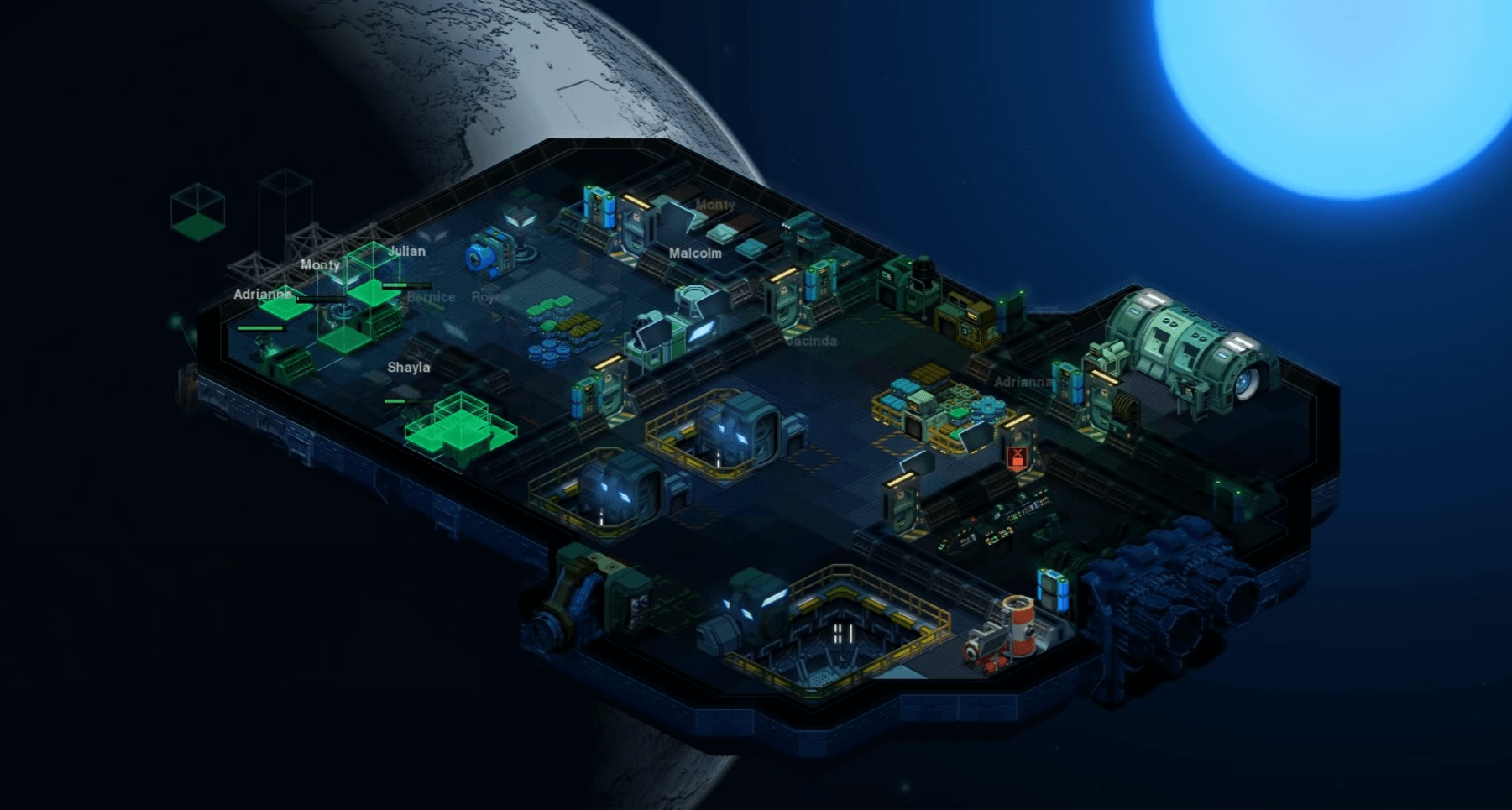
Just like Factorio, Space Haven is an intricate, open-world game that thrives on resource management and logistics. You are put in control of the creation and customization of your very own spaceship, and much like Factorio's mechanics of assembling working industrial systems, Space Haven requires you to manage a complex series of tasks, from the arrangement of individual rooms to changing the atmosphere based on your crew's needs. You will find the complex and engaging gameplay you loved in Factorio also present in Space Haven, as you engage with a variety of technologies, allocate resources, devise innovative strategies, and navigate challenging scenarios.
Moreover, if you enjoy the tactical detail and depth of Factorio, you will certainly appreciate the equally demanding micro-management aspect of Space Haven. Your tasks are not limited to building; your crew's varying needs, such as food, oxygen, mental health, and sleep have to be catered to meticulously. This adds a more human-centric perspective, increasing the depth and nuance of decision-making, much like the complex network of production and defense strategies in Factorio. The blend of resource management, survival, and strategic planning draws a remarkable parallel between the two games, appealing particularly to players seeking a sophisticated, intricate gaming experience.
Space Haven is available on platforms like Steam and GOG for Windows, MacOS, and Linux, typically priced around $25 USD.
16. Banished
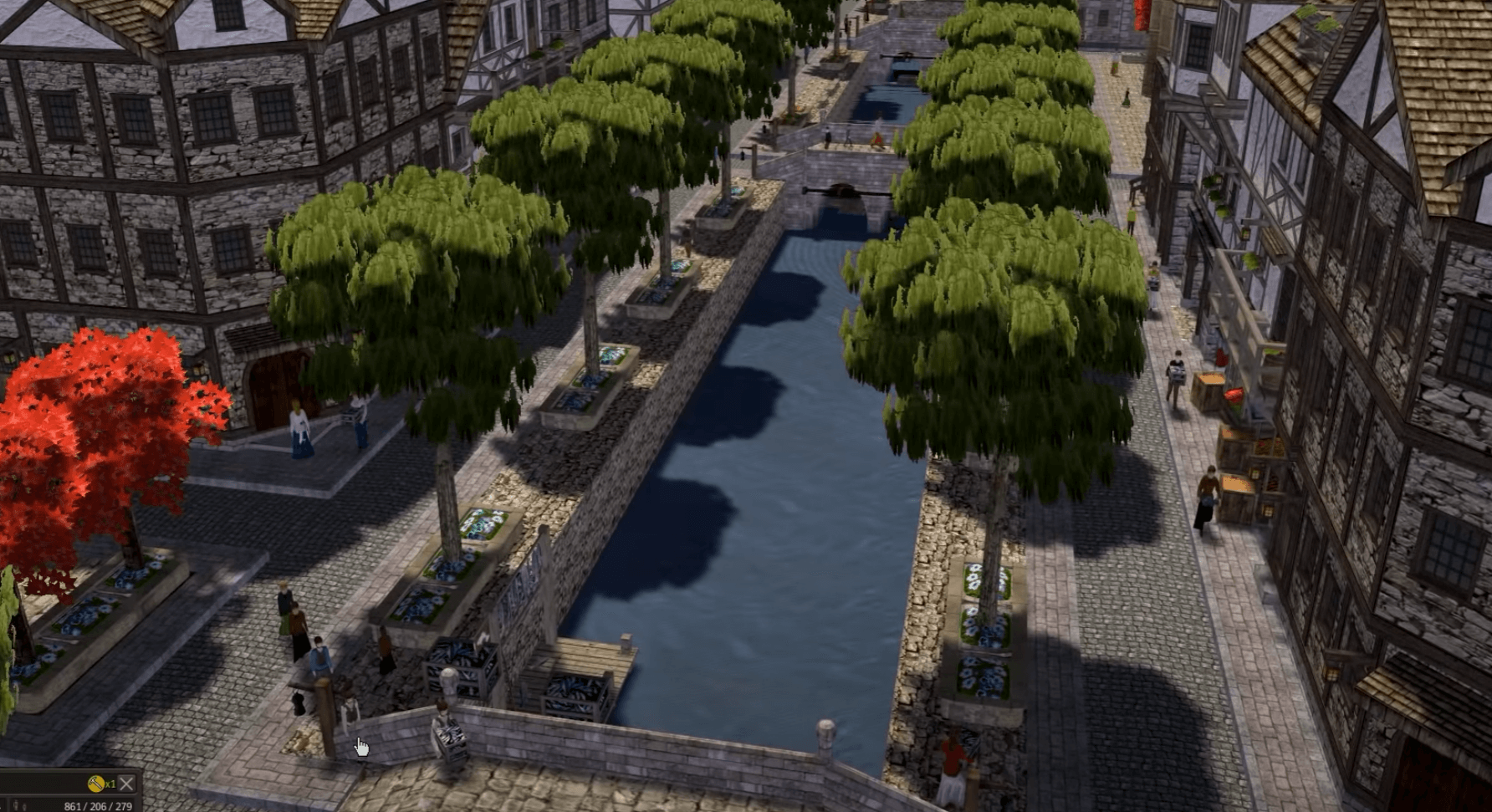
Like Factorio, Banished is a survival strategy game where you'll manage a settlement flourishing from scratch in a completely different environment. The critical similarity lies within the management and optimization feature, where you have to ensure proper utilization of resources for survival and expansion. You have citizens whom you need to provide with food, housing, and all the basic necessities. Moreover, you'll have to maintain a perfect balance between consumption and production, much like the resource balancing in Factorio. This creates a thrilling sense of urgency and strategic depth that's ever-present in the gameplay, which makes every decision you make significantly impactful.
In terms of its complexity, Banished poses a similar level of challenge as Factorio. Every tiny aspect of your civilization requires attention and flair for detail. The decisions you make regarding deployments of citizens to various tasks and resource management can lead to the rise or fall of your settlement. Your approach to the game, just like in Factorio, has to be highly strategic, employing real-time problem-solving mechanics. This game will indulge you in a different side of city building and managing workflow, giving you a taste of an era you've possibly never experienced in your gaming journey before.
Banished is available on Windows, typically priced around $20 USD.
15. Cities: Skylines
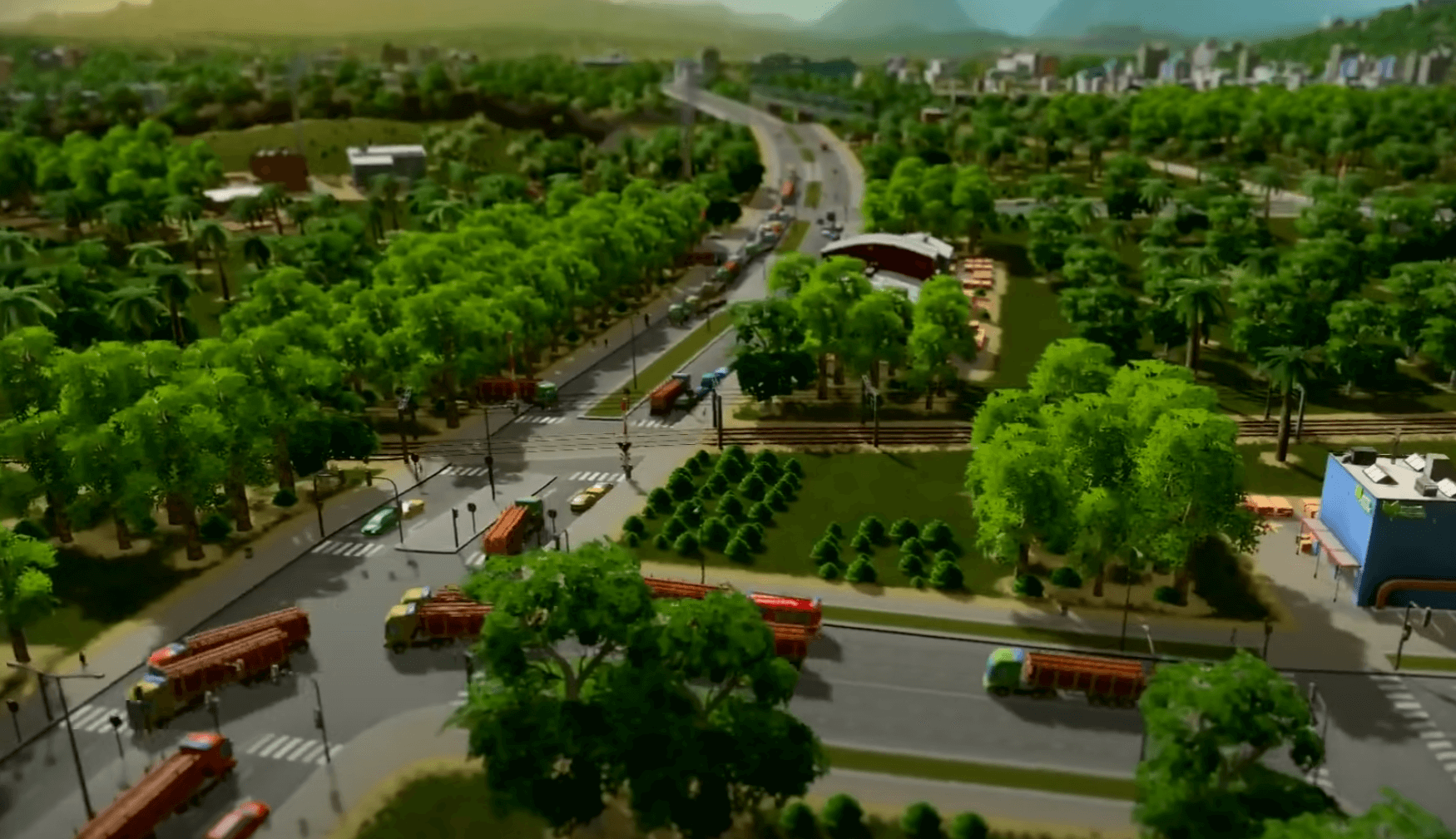
Cities: Skylines and Factorio are both immensely popular games that revolve around management and strategy. On one hand, Cities: Skylines lets you build and manage every aspect of a city, from zoning, traffic and public services, to taxation and maintaining public happiness. On the other hand, Factorio is all about automation, managing resources, and building elaborate factories. Despite their varied thematic approach, they both resonate with the same gameplay core of management, and grasp the joy of building something complex from scratch and seeing it work seamlessly, creating an engaging gameplay experience.
These games are very similar in the aspect of problem-solving and strategy. Both games challenge players to make the most efficient decisions based on what they have at the moment. For example, in Factorio, you might design the layout of your factory considering the most efficient way to transport resources and goods, while in Cities: Skylines, this strategic planning might translate to designing the best road network to minimize traffic and increase accessibility. Both games demand a balance between long-term strategies and immediate decisions, which adds a layer of cerebral satisfaction and engagement. If you've enjoyed the strategic intricacies of Factorio, you'll likely appreciate how Cities: Skylines gives you a different experience but with a familiar strategic depth.
Cities: Skylines is available on Microsoft Windows, macOS, Linux, PlayStation 4, and Xbox One, typically priced around $30 USD.
14. The Settlers
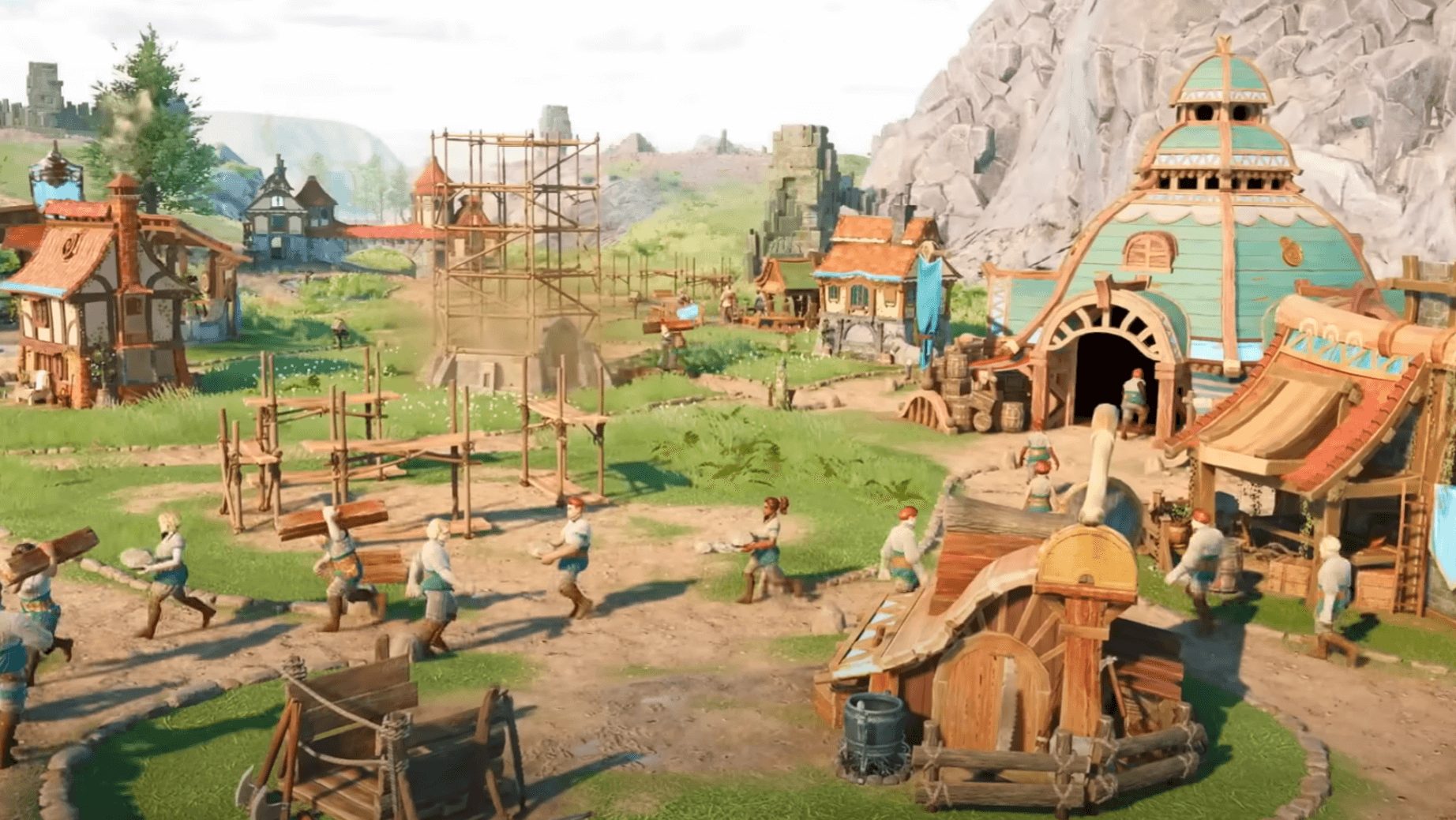
The Settlers series, much like Factorio, is all about resource management and building up your base in strategic ways. Though The Settlers has a more historical context with medieval and fantastical elements, the core gameplay mechanics involve mining resources, constructing buildings, and assembling an army for defense. Unlike some other strategy titles, where building structures occurs instantly, both Factorio and The Settlers provide the satisfaction of seeing your settlers or factory workers laboriously extract resources and construct buildings over time.
Like Factorio, The Settlers also has a tech tree that requires a careful allocation of resources. As you progress, your ability to extract and utilize resources expands, giving you access to new assets and capacities. Managing and optimizing these resource chains can be a rewarding mechanical challenge, similar to the automation sequences in Factorio. Both games also offer multiplayer modes, allowing you to compete or cooperate with others in developing your bases, which adds another layer of strategic depth to each game.
The Settlers is available on PC, typically priced around $30 USD.
13. Anno 1800
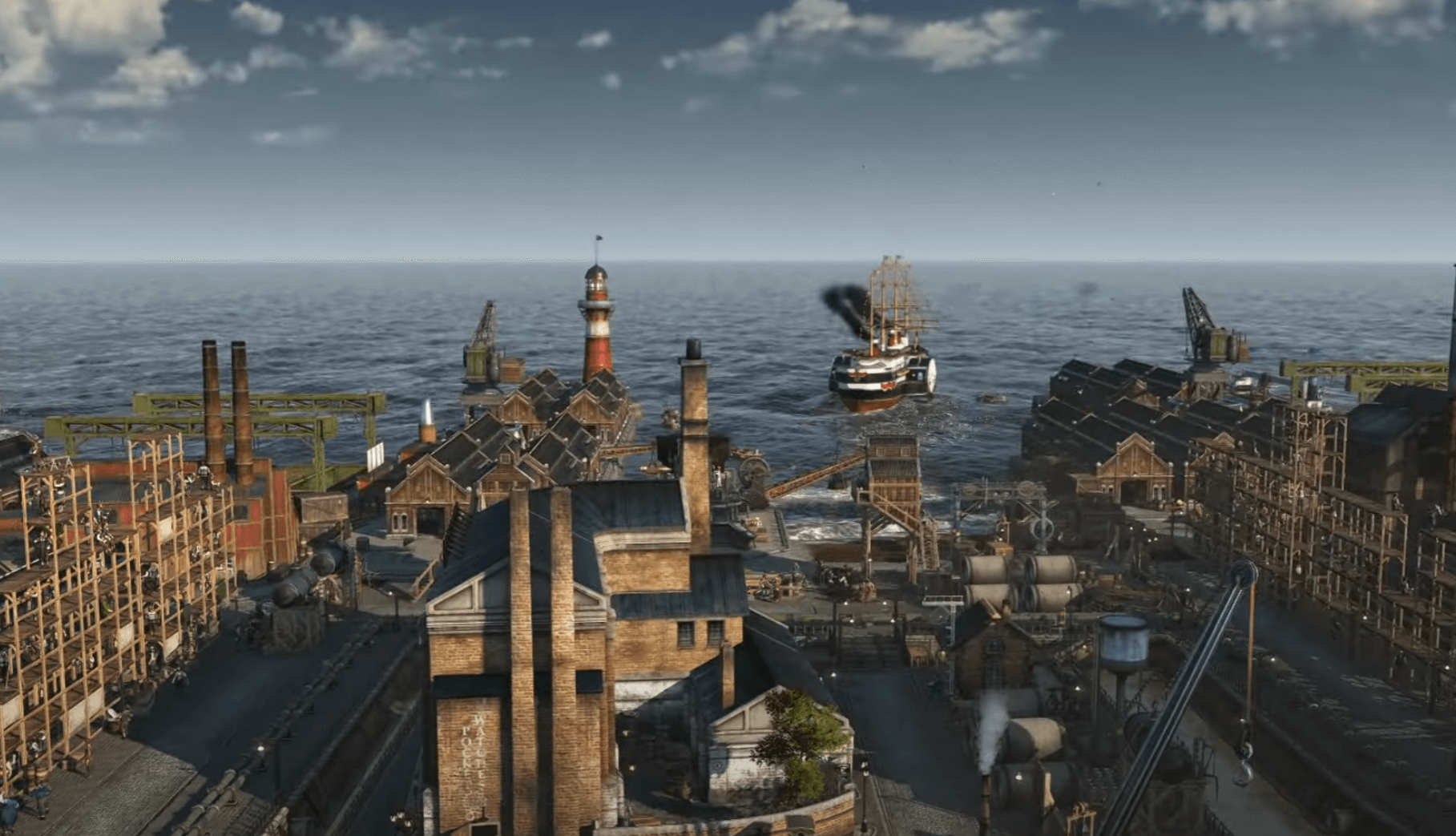
One aspect that Anno 1800 and Factorio share in common is the intricate process of resource management and production chains. Just like in Factorio, in Anno 1800, you need to gather resources such as lumber and stone to create buildings or transport goods. The game features an incredibly complex economy system where materials can be linked together to create an extensive production chain. For instance, you would need to gather wool from sheep farms to craft sails for your ships. Then, you need to ensure that these materials are transported effectively to their required destinations; much like how you would arrange an efficient and complex conveyor belt setup in Factorio.
Another fascinating feature shared by both games is the focus on growth and expansion. In Anno 1800, you start with a single island, and your mission is to expand your presence and control to other islands, just like how you would spread your factory in Factorio. You get to manage multiple islands simultaneously, creating a sense of multitasking and strategic planning akin to Factorio's sprawling factory development. As you advance, you will encounter challenges that will test your logistics and resource management skills, with the game throwing in situational elements like opponents, trade wars, and socio-political dilemmas.
Anno 1800 is available on PC, typically priced around $59.99 USD.
12. Frostpunk

In essence, Frostpunk is a city-building survival game, similar to Factorio, in how it emphasizes strategy, resource management, and base building. You are in charge of constructing and managing a city capable of surviving in a harsh, frozen world. The management aspect of resources and technologies mirrors the mechanics seen in Factorio. Both games encourage efficiency and require thoughtful decision making. Frostpunk puts an added twist of moral choices into the game play, creating unique challenges and outcomes. Like Factorio, Frostpunk is incredibly immersive and involves a lot of strategic planning to ensure your city runs efficiently and effectively.
Another common aspect between Frostpunk and Factorio is the steady ramping up of challenge and complexity as the game progresses. In Factorio, you build and manage automated factories to produce increasingly complex products, while in Frostpunk, you manage a city that constantly needs to adapt to increasingly harsh weather conditions. These challenges keep you on your toes and completely engaged, making every decision you make crucial to survival. In addition, both games have this reward system for planning ahead of time, strategising, and executing perfectly. If you loved the sense of accomplishment from building a self-sustaining factory in Factorio, you'll have similar experiences in Frostpunk when your city thrives even in the direst conditions.
Frostpunk is available on PC, PlayStation 4, and Xbox One, typically priced around $30 USD.
11. Papers, Please
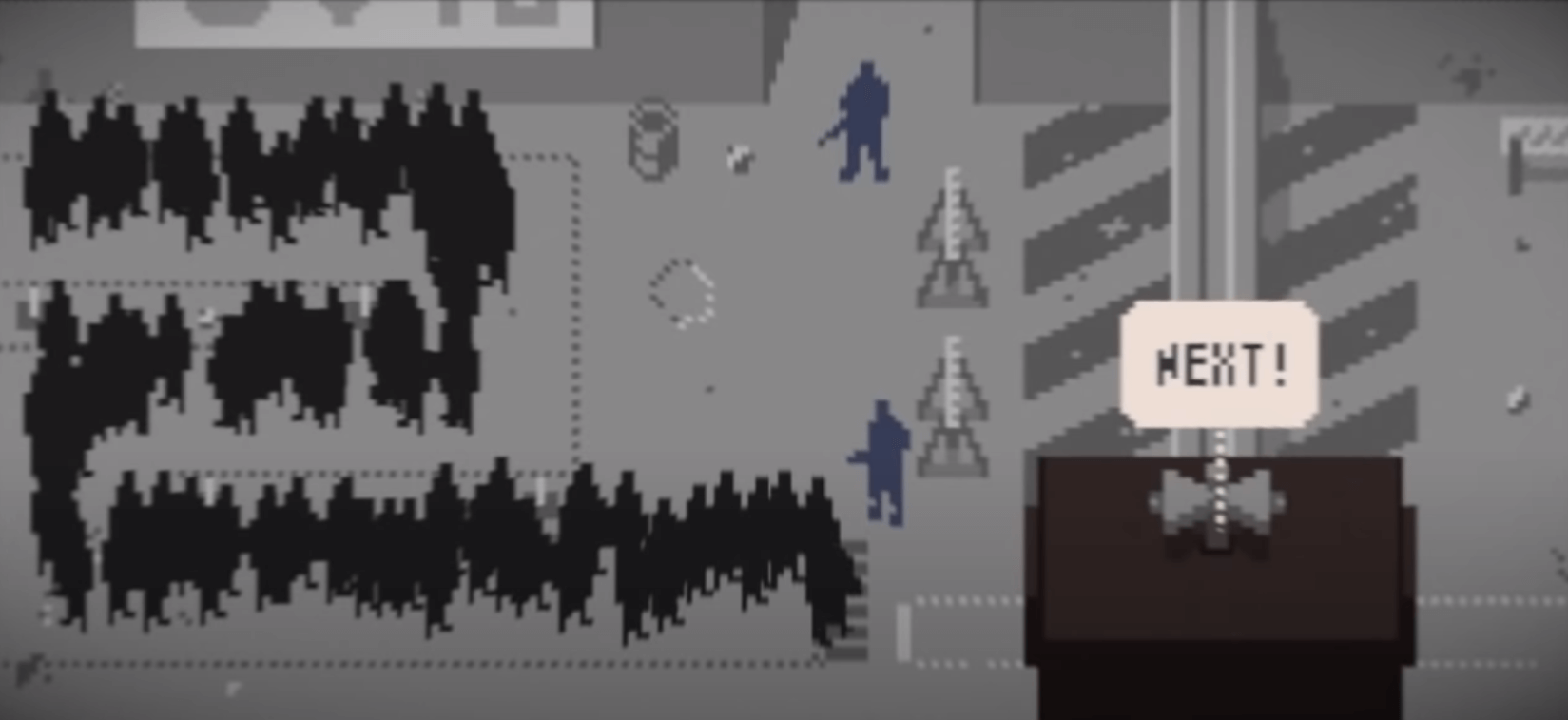
Both Papers, Please and Factorio share intricacies of task management and a strong emphasis on efficiency, albeit in quite different settings. In Factorio, you're investing your time into planning and optimizing automated industrial setups in a sandbox environment, while Papers, Please presents a bleak dystopian setting where you serve as an immigration officer, processing documents with strict attention to detail. Both games require critical thinking, problem-solving and adaptability to evolving scenarios, which can be a potent draw for the strategic and intellectual challenge seekers.
Moreover, while Factorio revolves around technical skills and material management in a bid to build a rocket to escape an alien world, Papers, Please demands a rather different yet not less challenging approach: an exercise in morality, bureaucracy, and handling human desperation. It presents you with choices laden with ethical dilemmas, requiring you to maintain tactical balance between job obligations and choosing a more empathetic approach. The resource management aspect is still there, with limited time to deal with increasing piles of paperwork and a family to provide for, similarly keeping you on your toes just like the onslaught of alien forces in Factorio. So, if you love the logistics, planning, and the thrill of constant problem solving in Factorio, you'd find Papers, Please an interesting shift in the same ballpark.
Papers, Please is available on Windows, OS X, Linux, and iOS platforms, typically priced around $10 USD.
10. Minecraft

The immersive world-building in both Minecraft and Factorio shares a common theme of creativity, resource management, and intricate designing. In both games, you start with literally nothing, in an open space filled with endless possibilities. As the game progresses, you mine and use resources to build increasingly complex structures, devices, and even entire ecosystems. Just as Factorio encourages you to create efficient production and transportation systems, Minecraft stimulates your creative juices to construct anything from a quaint log cabin to a grandiose castle.
Besides, the heart-thumping survival elements are another shared aspect of these games. In Factorio, you build various defences to ward off local fauna that despise your industrial presence, while in Minecraft, once the sun sets, you have to protect yourself from marauding creatures of the night, which certainly adds an exciting layer of intensity. Both games provide rich technology trees, extensively engaging the player in a cycle of exploration, expansion, exploitation, and extermination.
Minecraft is available on PC, PlayStation 4, Xbox One, Nintendo Switch, mobile devices, and is typically priced around $20 USD.
9. Stardew Valley

Stardew Valley, much like Factorio, is a game that thrives on resource management and creativity. Instead of creating and maintaining an expansive factory like in Factorio, you create and manage a thriving farm. It's a game that puts crafting, resource optimization, and time management at its core in a charming and visually appealing package. You might be farming crops instead of mining resources, but the care, planning and optimization that goes into managing your farm, dealing with the produce cycle and managing financial aspects is reminiscent of Factorio's building and resource management processes.
What sets Stardew Valley apart from many games in the genre, and makes it similar to Factorio, is how deep and complex the game can become. You're not just looking after your farm, but also developing relationships with other characters, exploring mysterious mines for resources, and even battling monsters. The process of exploring, gathering, building and becoming more proficient in various in-game skills offers a similar sense of satisfaction to Factorio. The game combines the farming genre with crafting and survival elements, allowing you to progressively automate processes and enhance your productivity, echoing the same cycle of efficiency found in Factorio.
Stardew Valley is available on PC, PS4, Xbox One, and Nintendo Switch, typically priced around $15 USD.
8. Terraria

One of the striking similarities between Terraria and Factorio is the element of sandbox-style gameplay that allows for a high degree of player creativity. Terraria, like Factorio, is characterized by its freedom to explore, build, and shape the game world to your liking. Both games engage players in resource gathering and crafting systems to expand their capabilities and progress the gameplay. The constant lure of the unknown and unexplored, coupled with the thrill of unlocking rarer resources, creates a similar sense of accomplishment in Terraria as you would find in Factorio.
Another distinguishable parallel between these two involves the sense of progression. Factorio and Terraria both revolve around a technology or power progression system that requires a well-thought strategy, planning and subtle resource management. In all stages of the games, players are challenged to optimize their methodologies for gathering and crafting while simultaneously defending against potential threats. One remarkable difference is that Terraria incorporates layers of a role-playing game (RPG) element with character building and a broader range of enemies to defeat.
Terraria is available on PC, PlayStation 4, Xbox One, and Nintendo Switch systems, typically priced around $29.99 USD.
7. Starbound

Starbound, similar to Factorio, is a sandbox-style game where the objectives are largely set by the player. Both games revolve around resource gathering, crafting, and building complex structures and machines. In Starbound, you start by repairing your spaceship and then you colonize planets, mine for resources and construct buildings and technologies. Just as Factorio, this game encourages creativity, lateral thinking, and offers endless playthroughs with its procedurally generated world where every game is unique.
Another similarity between the two games lies in the immense sense of satisfaction found in orchestrating complex systems. In Factorio, you might be setting up intricate automated factories, whilst in Starbound you could spend hours meticulously planning a thriving planetary colony. Certainly, both games are known for their ability to "suck you in", with hours passing in what seems like minutes as you constantly refine, expand, and increase the complexity of your operations. Plus, both games offer the chance to fend off hostile creatures and forces, providing an extra sense of challenge and urgency to your gameplay.
Starbound is available on PC, Mac, and Linux, typically priced around $15 USD.
6. Dwarf Fortress
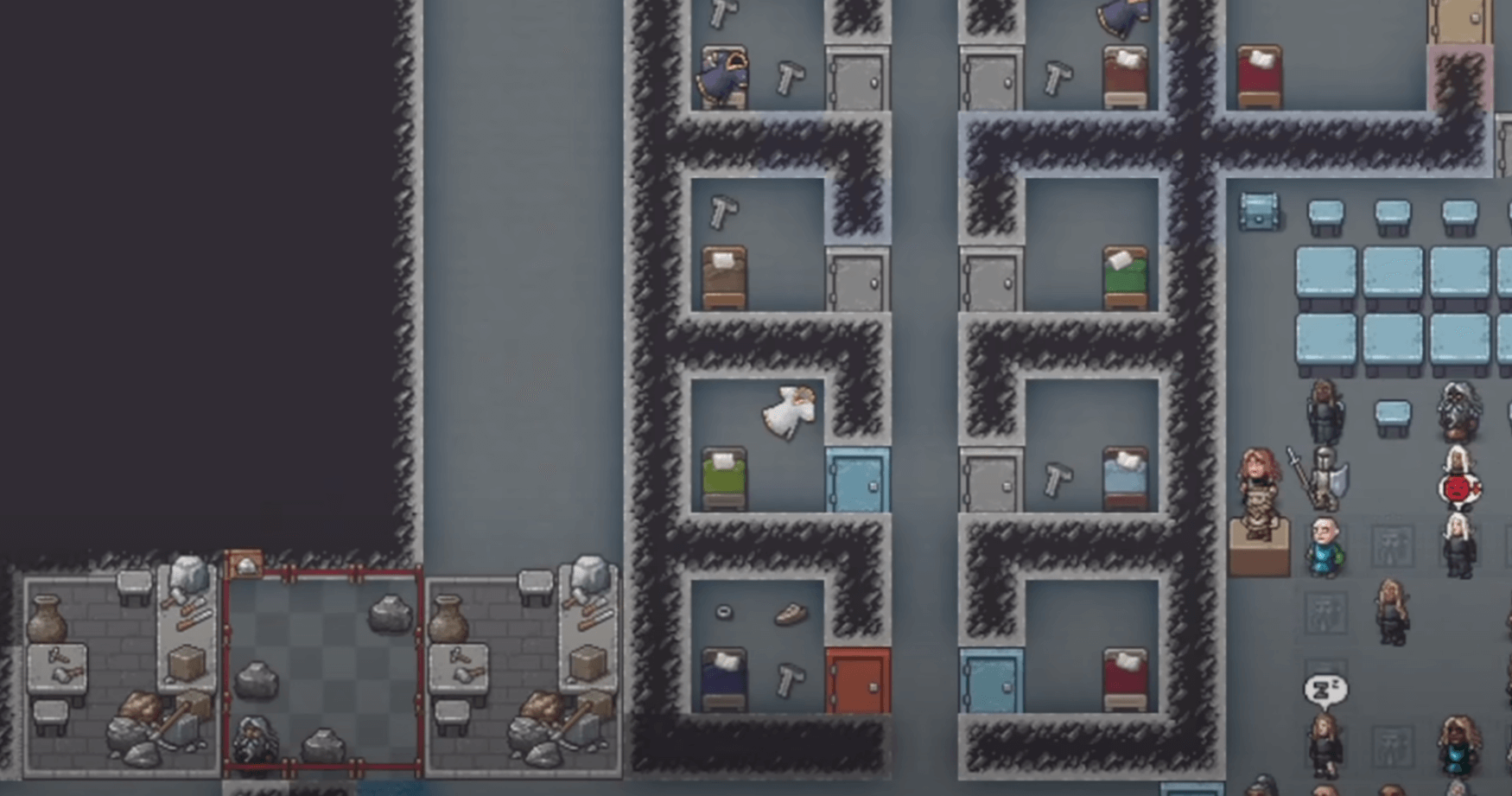
Dwarf Fortress, much like Factorio, is an intricate strategy game that demands a level of patience, meticulous planning, and resource management. They share a profound commitment to depth and complexity that can lead to some of the most rewarding gameplay experiences. Both games feature real-time building, gathering resources, and exploring a procedurally generated world rich in vaults of countless minerals and raw materials. The difference lies predominantly in the graphical representation where Dwarf Fortress can be more challenging to apprehend at first, but as with Factorio, once you get past the learning curve, a world full of complex mechanics and near-infinite possibilities opens up.
Another shared aspect of Dwarf Fortress and Factorio is the unique storytelling element. Both games allow you to build, grow and manage a colonizing entity, either it's dwarves or automatons. Here, even the smallest decisions can have massive consequences, accounting for an endless variety of gameplay experiences. Like Factorio, Dwarf Fortress doesn't have pre-set goals; rather, the beauty of these games lies in the autonomy given to the player to set their objectives and the satisfaction of seeing your carefully executed plans coming to fruition. Expect a lot of trial and error, adaptability, and learning from your mistakes, as both these games are defined by their emergent gameplay.
Dwarf Fortress is available on Bay 12 Games' official website, typically priced around $0 USD. It is also available on platforms such as Steam and itch.io with a premium version, which includes enhanced graphics and new music, typically priced around $20 USD.
5. Planet Coaster
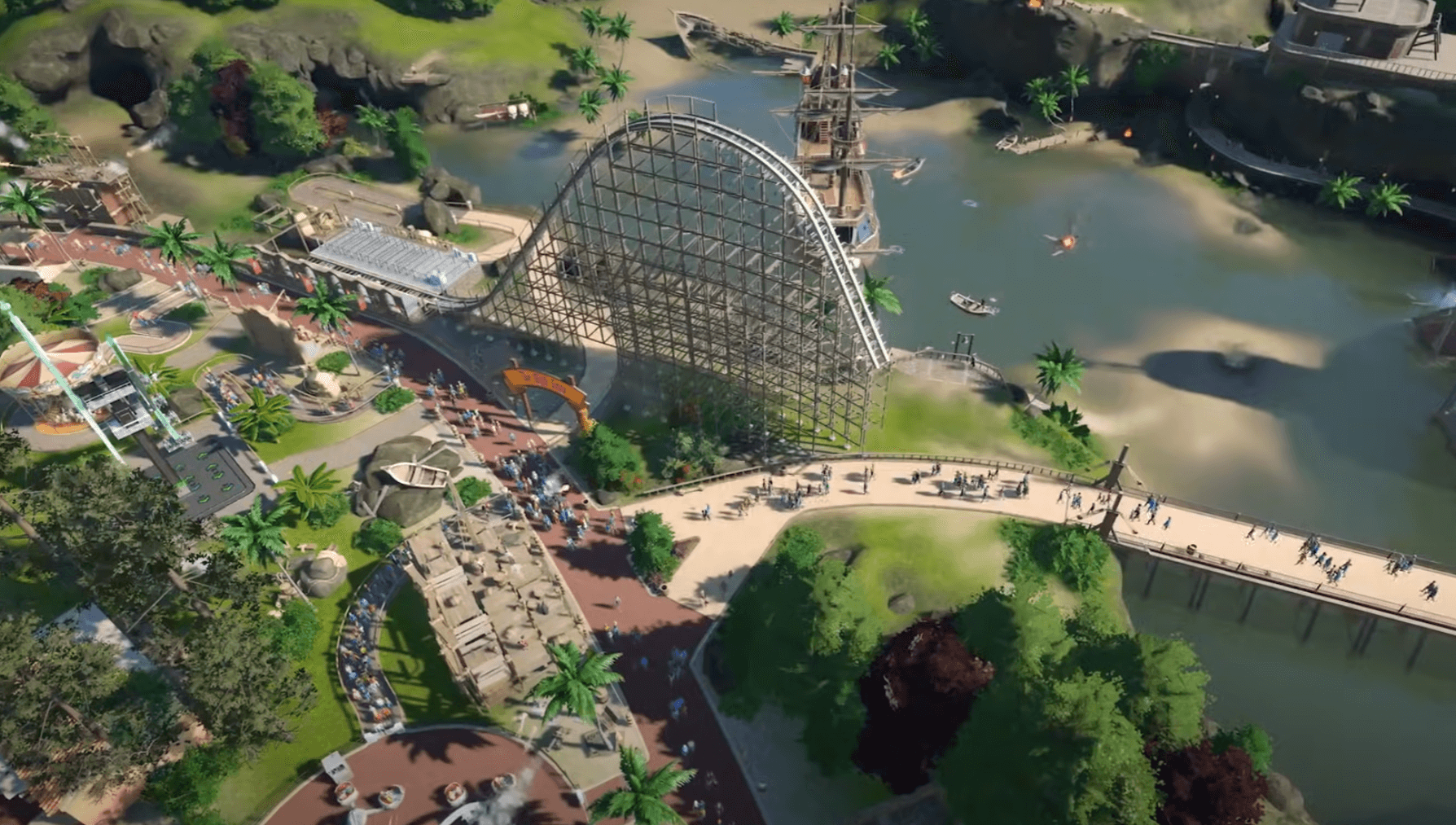
While Planet Coaster and Factorio may appear different at first glance, both games share a deep appreciation for creativity, efficiency, and meticulous planning. In Factorio, you establish, manage and optimize complex factories, whereas in Planet Coaster, you leverage the same meticulous planning to construct your own dream amusement park from the ground up. In both games, achieving an efficient, smoothly-run operation requires a good understanding of various systems and some ingenious creativity.
Similar to how Factorio provides you with raw materials which you then have to process and manufacture into finished goods, Planet Coaster gives you a variety of different tools and resources, enabling you to express your creativity in constructing unique, stunning park structures and entertaining rides. Furthermore, both games offer a form of sandbox mode where you can unleash your creativity with fewer constraints. Thus, if you enjoyed the strategic planning and creativity imbued in Factorio, Planet Coaster presents a similar appeal, albeit in a completely different landscape.
Planet Coaster is available on Windows, PlayStation 4, PlayStation 5, Xbox One, and Xbox Series X and Series S, typically priced around $45 USD.
4. Craft the World
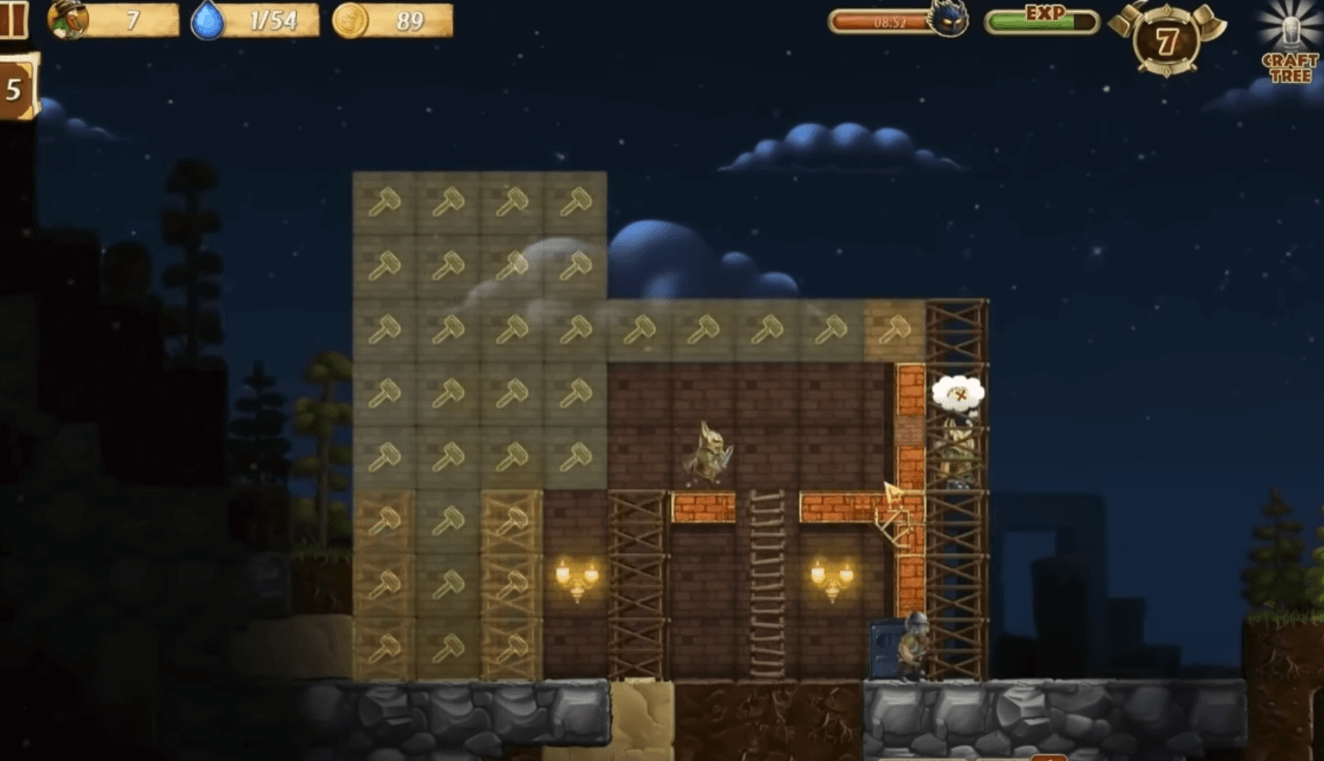
Craft the World shares key elements with Factorio that you'll most certainly appreciate, particularly the base-building and resource management aspects. Just like Factorio, Craft the World focuses heavily on crafting and automation. But it takes the concept to a different level by introducing aspects of tower defense and survival mechanics. This means you'll spend time not only building and expanding your base but also strategically placing defenses to protect it from onslaughts of enemy creatures, giving you a blend of strategy and action-packed gaming.
Another similarity Craft the World has with Factorio is the ability to automate processes. As you progress in the game, you recruit dwarves who can perform jobs for you, somewhat similar to how you'd automate processes in Factorio. This eventually allows you to transition from manual labor to managing a network of industrious little characters, each contributing to your growing base. Additionally, just like in Factorio, there's a certain level of satisfaction that comes from setting up efficient production workflows and seeing everything run like a well-oiled machine. Thought planning and the strategic use of resources are necessary in both games, making for a rewarding gameplay experience.
Craft the World is available on Steam, and you can also find it in the App Store for your iOS devices. It's typically priced around $19.00 USD.
3. Space Engineers

Space Engineers is a sandbox game about engineering, construction, exploration, and survival in space and on planets. It has many features which are similar to Factorio, such as a wide range of building components, a realistic physics engine, and a complex production tree. If you enjoyed the intricate process of constructing and optimizing factories in Factorio, you'll love the detail that goes into designing and building spaceships, stations, and planetary outposts in Space Engineers. Crafting is also a major aspect of gameplay. Just like Factorio, you have to mine resources, construct parts, and manage energy usage, making the games feel like two sides of the same coin.
The game also shares Factorio's focus on technological progression and overcoming environmental challenges. Instead of waves of alien creatures, you are faced with the vacuum of space, the harshness of planetary environments, and the occasional hostile NPC. Furthermore, Space Engineers has a multiplayer mode that allows you to collaborate on complicated projects in the same way you might team up to run a factory in Factorio. The environments are also procedurally generated, ensuring a new gaming experience each time you start a new world.
Space Engineers is available on Microsoft Windows, typically priced around $20 USD.
2. Astroneer

If you're a fan of Factorio, then you might want to check out Astroneer. Developed by System Era Softworks, Astroneer shares a lot of elements that made Factorio enjoyable. Like Factorio, Astroneer takes place on an alien planet and the key aim of the game is resource extraction and management. There are a plethora of resources scattered all around the planet which you can use to build your base, craft equipment, and research new technologies. Despite being set in a completely different milieu, Astroneer retains the core mechanic that drives Factorio, which is automation. Automating resource extraction is a crucial part of Astroneer gameplay.
Another intriguing feature that is loved by many in Factorio is base building, which Astroneer also successfully incorporates into its gameplay. Base building and management are exciting parts of Astroneer, you need to strategize your base layout for optimal efficiency, similar to how you would in Factorio. Additionally, Astroneer's breathtaking low-poly art style and stunning environments add a unique touch to the game. Exploring the aesthetic cosmic expanses while you work on your resource management strategies resembles Factorio's gameplay but in an entirely different context, visually and atmospherically. If you enjoy Factorio's gameplay loop of exploration, gathering, crafting, and building, then Astroneer's take will surely be something that would interest you.
Astroneer is available on PlayStation 4, Xbox One, and PC, typically priced around $30 USD.
1. They Are Billions
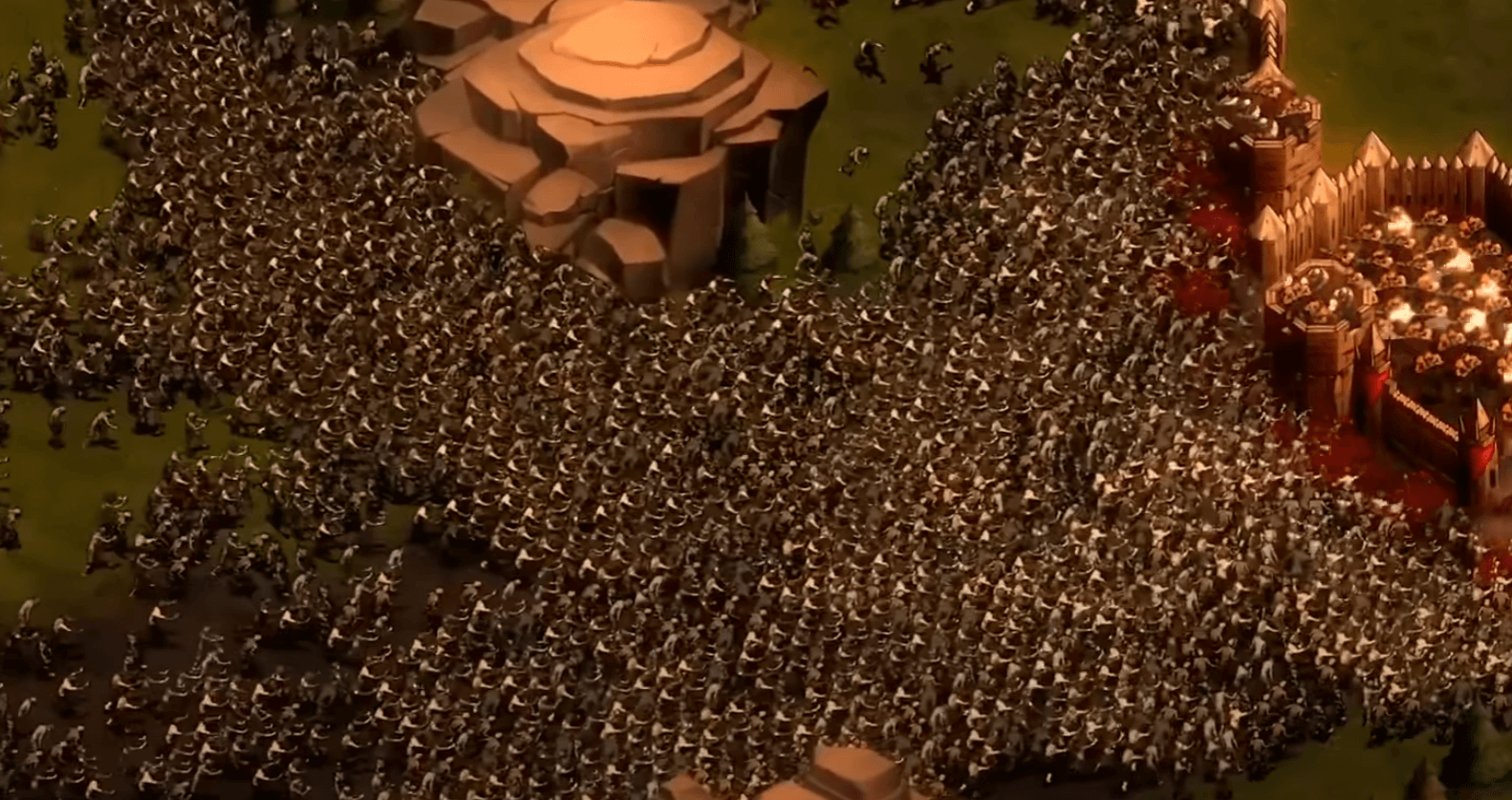
They Are Billions and Factorio share an engaging and thrilling base-building mechanic that drives much of their gameplay. Just like in Factorio, in They Are Billions, you have control over constructing and managing a colony. In both games, you harvest resources, build infrastructure and defend your base against enemy onslaughts. Both games also encourage and reward efficient planning and the strategic allocation of resources, which adds a layer of depth that pulls you into the experience and keeps you immersed. The joy of seeing a plan come to fruition, whether it's constructing a complex production line or successfully defending your base from a wave of attackers, can be found in both Factorio and They Are Billions.
In terms of the broader strategic landscape, both games share the common theme of survival in a hostile environment. Factorio leaves you stranded on an alien planet with the goal of creating a rocket to escape, while They Are Billions pits you against hordes of zombies in a post-apocalyptic steampunk world. This 'us against the world' theme permeates both games and constantly adds tension and stakes to your decisions. Moreover, They Are Billions expands on this concept with its real-time strategy elements, adding a more immediate and constant sense of danger. This drives you to adapt and react on-the-fly, similar to how Factorio's dynamic eco-system evolve over time and forces you to constantly rethink your strategies.
They Are Billions is available on PC, PS4, and Xbox One, typically priced around $30 USD.
You've reached the end! Check out the home page for more informative articles on your favorite games.